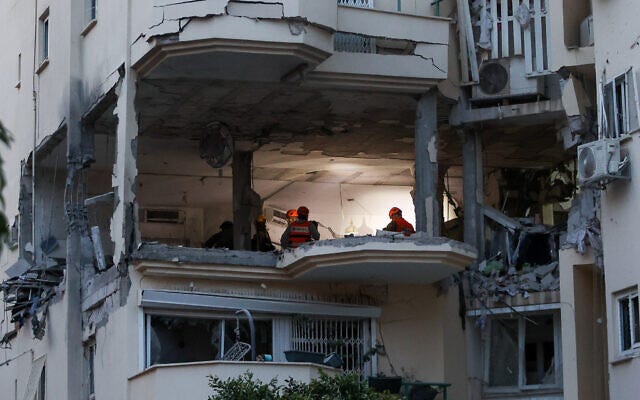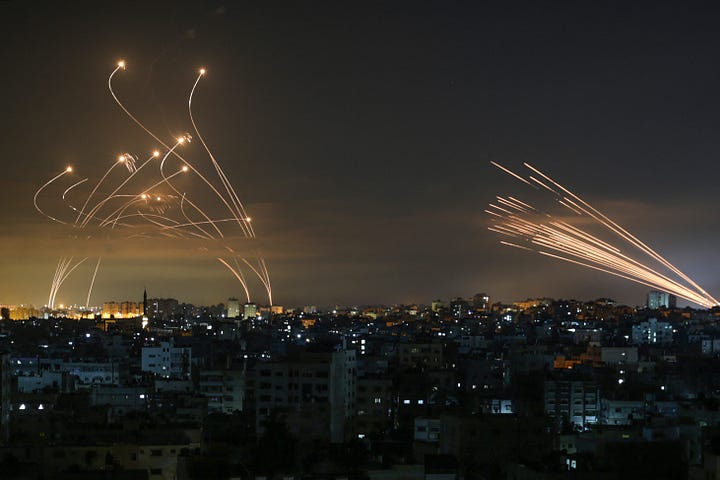

On Thursday evening May 11th, our son, daughter-in-law and three grandchildren who live in Rehovot, Israel were trying to navigate one of the dilemmas of life in Israel: how to find normalcy in an often-abnormal situation.
Between May 9th and May 13th, the terrorist organization Palestinian Islamic Jihad (PIJ), based in Gaza and supported by Iran, fired more than 1,400 rockets at Israeli civilians.
The initial cause of this round of fighting was PIJ rocket fire from Gaza into southern Israel. The Israel Air Force responded by carrying out targeted strikes that killed three senior PIJ leaders. Then PIJ let loose barrages of rockets over a five-day period that sent millions of Israelis into shelter when their sirens went off.
For our son Dan and his family who live in central Israel, this experience repeats itself about once every eighteen months. Yet, for those living in southern Israel near the Gaza border, rocket attacks occur much more frequently.
The first time our grandchildren had to run to seek shelter from rocket fire was in August 2014 during Operation Protective Edge. During that operation, Hamas and Palestinian Islamic Jihad fired more than 4,500 rockets at Israeli civilians.
After things calmed down, our son and his family came to visit us in America. During a trip to a shopping mall, our granddaughter Moriyah, then three years old, asked her mother, “Mommy, where will we go if the sirens go off?”
There is no doubt that these experiences take a psychological toll on Israeli children.
Although Israel’s amazing rocket defense system, Iron Dome, has saved thousands of Israeli lives with a 95% success rate, it is not perfect. It is not hermetic.
When sirens go off, Israelis need to seek shelter. Even when Iron Dome successfully intercepts a rocket over an Israeli city, shrapnel falls out of the air. And you don’t want to be in the streets with metal fragments falling out of the sky.
At 6:00 PM on May 11th, a Burak 85 rocket was launched from Gaza toward the city of Rehovot where our son and his family live.
For whatever reason, Iron Dome did not intercept. The rocket hit an apartment building less than a mile from where they live and killed an elderly lady who was trying to get her wheelchair-bound husband into the safe room.
At the same time, when the sirens went off, our grandchildren instinctively knew the drill.
Our now twelve-year-old granddaughter, Moriyah, grabbed her eight-year-old brother Eliav, went into the stairwell and down two flights to a safer space. She sent a text to her mother that she and Eliav were ok.
Our fourteen-year-old grandson Gideon, who was in the shower, had to grab a towel and run down the stairs. Whitney, our daughter-in-law, made sure the kids were ok, grabbed the family dog and did the same.
In the meantime, our son Dan was out doing errands. As he wrote on Facebook, “That was close, very close…. I was driving home and pulled over - and took cover (and prayed) by the side of the road. The boom was incredibly loud and very nearby. There’s not really anywhere to take cover on a sidewalk. I don’t know if it helped - but I was next to a father and his two young boys.”
Less than an hour later, we called them on WhatsApp to see if everyone was ok.
Our granddaughter Moriyah was already trying on a new dress. That night, the whole family went to a Bar Mitzvah party. And that same night in Tel Aviv, which had been targeted earlier that day, there was a rock concert with some 30,000 people attending.
In the bigger picture, since Israel withdrew unilaterally from Gaza in 2005, Hamas and Palestinian Islamic Jihad have fired more than 19,000 rockets at Israeli civilians. And that’s in addition to the 4,000 rockets fired by Hezbollah from Lebanon into northern Israel during the Second Lebanon War of 2006.
May 11th was a profile in resilience. Surrounded by terrorist organizations backed by Iran, the people of Israel simply try to live a normal life in an abnormal situation.
Bob Feferman
Community Relations Director
574-233-1164 x1815
RFeferman@TheJewishFed.org



